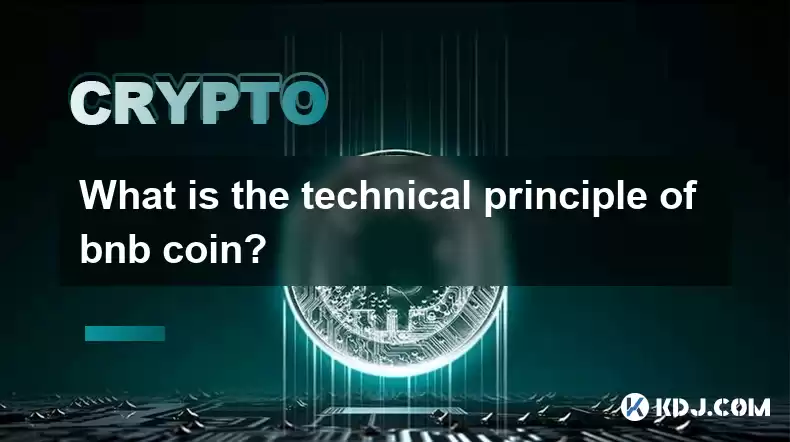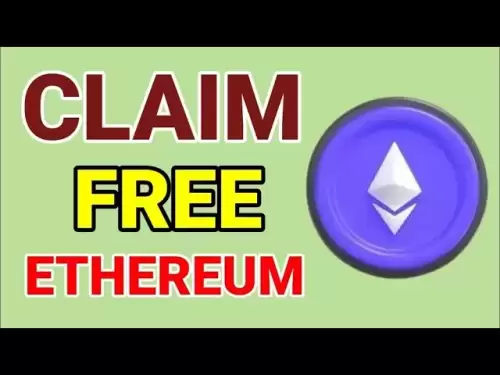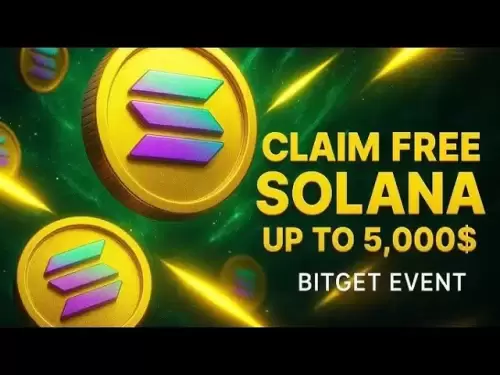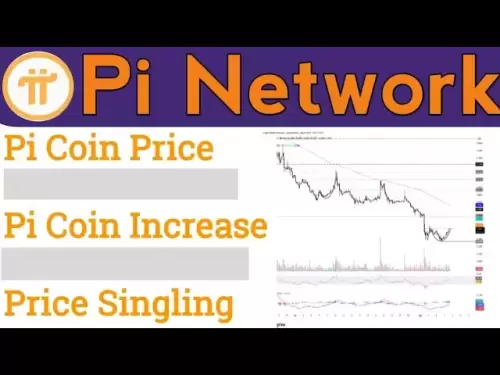-
 Bitcoin
Bitcoin $118300
1.01% -
 Ethereum
Ethereum $4215
0.69% -
 XRP
XRP $3.198
-3.83% -
 Tether USDt
Tether USDt $1.000
-0.01% -
 BNB
BNB $803.4
-0.53% -
 Solana
Solana $180.3
-0.67% -
 USDC
USDC $0.9998
-0.01% -
 Dogecoin
Dogecoin $0.2334
-1.49% -
 TRON
TRON $0.3394
0.86% -
 Cardano
Cardano $0.7980
-1.45% -
 Chainlink
Chainlink $22.19
6.65% -
 Hyperliquid
Hyperliquid $43.41
0.13% -
 Stellar
Stellar $0.4407
-3.13% -
 Sui
Sui $3.843
-2.24% -
 Bitcoin Cash
Bitcoin Cash $564.7
-3.74% -
 Hedera
Hedera $0.2588
-3.41% -
 Ethena USDe
Ethena USDe $1.001
0.00% -
 Avalanche
Avalanche $23.64
-3.37% -
 Litecoin
Litecoin $120.0
-4.01% -
 Toncoin
Toncoin $3.342
-1.11% -
 UNUS SED LEO
UNUS SED LEO $9.038
0.60% -
 Shiba Inu
Shiba Inu $0.00001347
-0.81% -
 Uniswap
Uniswap $10.69
-4.58% -
 Polkadot
Polkadot $4.034
-1.30% -
 Dai
Dai $1.000
0.01% -
 Bitget Token
Bitget Token $4.472
-1.52% -
 Cronos
Cronos $0.1571
-3.04% -
 Pepe
Pepe $0.00001207
-2.21% -
 Monero
Monero $273.8
-3.19% -
 Ethena
Ethena $0.7520
2.75%
What is the technical principle of bnb coin?
BNB, Binance's native token, leverages Binance Chain's high-throughput DPoS consensus for secure transactions, expanding functionality with Binance Smart Chain's smart contracts, offering fee reductions, staking rewards, and broader ecosystem utility.
Mar 05, 2025 at 06:42 am

Key Points:
- BNB Coin's technical foundation lies within the Binance Chain, a blockchain designed for high-throughput transactions.
- Its consensus mechanism, initially delegated proof-of-stake (DPoS), has evolved, enhancing security and efficiency.
- BNB's utility extends beyond its role as a native token, encompassing fee reductions, access to services, and staking opportunities within the Binance ecosystem.
- Smart contract functionality, implemented through Binance Smart Chain (BSC), expands BNB's capabilities and applications.
- Security features like the DPoS consensus and Binance's infrastructure contribute to BNB's overall robustness.
What is the technical principle of BNB Coin?
BNB, the native token of the Binance ecosystem, operates on a multifaceted technical foundation. Its core functionality is intrinsically linked to the Binance Chain and, more recently, the Binance Smart Chain (BSC). Understanding its technical principles requires examining these intertwined components.
The Binance Chain, initially launched in 2019, was designed to provide a fast and efficient platform for cryptocurrency transactions. Unlike Bitcoin's proof-of-work (PoW) mechanism, Binance Chain initially employed a delegated proof-of-stake (DPoS) consensus mechanism. This method allows elected validators to verify and add transactions to the blockchain, significantly increasing transaction speed and reducing energy consumption compared to PoW.
The DPoS system within Binance Chain selects validators through a voting process where BNB holders can stake their tokens to support their preferred validators. This system incentivizes validators to act honestly and efficiently, as their rewards are tied to their performance and the network's overall health. This selection process is key to maintaining the security and integrity of the Binance Chain.
Binance Smart Chain (BSC), launched later, introduced smart contract functionality to the BNB ecosystem. This allowed for the creation of decentralized applications (dApps) and more complex financial instruments built directly upon the BNB blockchain. BSC maintains its own separate blockchain, interacting with the Binance Chain. This expansion broadened BNB’s utility, allowing it to function within a more decentralized and programmable environment.
BNB's role extends beyond simply being a transactional token. It serves as a means of paying transaction fees on both Binance Chain and BSC. Holding BNB can often result in reduced trading fees on the Binance exchange, providing a direct incentive for users to hold and utilize the token. Furthermore, BNB is frequently used in staking programs, offering holders passive income opportunities and contributing to the security of the network.
Security Features of BNB and the Binance Ecosystem:
The security of BNB is interwoven with the security measures implemented by Binance and the underlying blockchain technology. The DPoS consensus mechanism, as previously discussed, plays a crucial role in ensuring the integrity of transactions. The selection of validators, along with the ability of token holders to vote, introduces a layer of accountability and reduces the risk of malicious actors gaining control of the network.
Beyond the consensus mechanism, Binance itself invests heavily in security infrastructure to protect the exchange and its users. This includes robust security protocols, regular audits, and measures to prevent hacking and fraud. While no system is entirely immune to vulnerabilities, Binance's substantial investments in security aim to minimize risks associated with holding and using BNB.
Evolution of BNB's Technical Principles:
The Binance ecosystem and, consequently, BNB's technical underpinnings have evolved over time. While initially focused on the Binance Chain and its DPoS consensus, the introduction of BSC significantly broadened its capabilities. This expansion has opened doors to new functionalities and applications, solidifying BNB's position as a versatile cryptocurrency.
BNB's Role in the Binance Ecosystem:
BNB's significance lies in its integration into the broader Binance ecosystem. It’s not merely a standalone cryptocurrency; it’s a core component that fuels various services and functionalities within the Binance platform. This integrated role distinguishes BNB from many other cryptocurrencies, emphasizing its utility beyond simple speculation.
Frequently Asked Questions:
Q: Is BNB a Proof-of-Work (PoW) cryptocurrency?
A: No, BNB is not a PoW cryptocurrency. It originally utilized a Delegated Proof-of-Stake (DPoS) consensus mechanism on Binance Chain.
Q: What is the difference between Binance Chain and Binance Smart Chain?
A: Binance Chain focuses primarily on high-speed transactions. Binance Smart Chain extends functionality to include smart contracts, enabling decentralized applications (dApps).
Q: How does staking BNB work?
A: Staking BNB involves locking up your tokens to support a validator on the Binance Chain network. In return, you earn rewards in BNB.
Q: How secure is BNB?
A: BNB's security relies on the DPoS consensus mechanism of Binance Chain, the security measures implemented by Binance, and the overall robustness of the Binance ecosystem. However, no system is entirely risk-free.
Q: What are the main use cases for BNB?
A: BNB is used for paying transaction fees on Binance Chain and BSC, gaining access to discounts on Binance exchange fees, staking for rewards, and participating in the governance of the Binance ecosystem. It is also used within the many dApps built on BSC.
Q: Can I use BNB on other exchanges besides Binance?
A: Yes, BNB is listed on many major cryptocurrency exchanges, allowing trading and usage beyond the Binance platform.
Q: What is the future of BNB?
A: The future of BNB is tied to the continued growth and evolution of the Binance ecosystem. Its utility within this ecosystem, coupled with its expanding capabilities through BSC, will be major factors influencing its future value and adoption.
Disclaimer:info@kdj.com
The information provided is not trading advice. kdj.com does not assume any responsibility for any investments made based on the information provided in this article. Cryptocurrencies are highly volatile and it is highly recommended that you invest with caution after thorough research!
If you believe that the content used on this website infringes your copyright, please contact us immediately (info@kdj.com) and we will delete it promptly.
- Dogwifhat's Comeback: Solana Meme Coin Mania and Beyond!
- 2025-08-10 18:30:15
- Shiba Inu Price Drop Alert: Can Google AI Predict the Future?
- 2025-08-10 18:30:15
- NEAR Protocol Rebound: Eyes on $4.63 as Bullish Momentum Builds
- 2025-08-10 17:30:13
- Bitcoin Cash Halving: Will the Price Fall or Fly?
- 2025-08-10 17:30:13
- Uniswap (UNI) Under Bearish Pressure: A Technical Analysis Deep Dive
- 2025-08-10 17:30:15
- DOT Price on the Rise: Polkadot's Bullish Momentum Heats Up!
- 2025-08-10 17:30:15
Related knowledge

How to purchase Aragon (ANT)?
Aug 09,2025 at 11:56pm
Understanding Aragon (ANT) and Its PurposeAragon (ANT) is a decentralized governance token that powers the Aragon Network, a platform built on the Eth...

What is the most secure way to buy Ocean Protocol (OCEAN)?
Aug 10,2025 at 01:01pm
Understanding Ocean Protocol (OCEAN) and Its EcosystemOcean Protocol (OCEAN) is a decentralized data exchange platform built on blockchain technology,...

Where can I buy UMA (UMA)?
Aug 07,2025 at 06:42pm
Understanding UMA and Its Role in Decentralized FinanceUMA (Universal Market Access) is an Ethereum-based decentralized finance (DeFi) protocol design...

How to buy Storj (STORJ) tokens?
Aug 09,2025 at 07:28am
Understanding Storj (STORJ) and Its Role in Decentralized StorageStorj is a decentralized cloud storage platform that leverages blockchain technology ...

What is the best app to buy Nano (NANO)?
Aug 09,2025 at 03:35am
Understanding Nano (NANO) and Its Unique FeaturesNano is a feeless, instant cryptocurrency designed for fast peer-to-peer transactions. Unlike many ot...

Where can I purchase Siacoin (SC)?
Aug 08,2025 at 11:14am
Understanding Siacoin (SC) and Its Role in the Sia NetworkSiacoin (SC) is the native cryptocurrency of the Sia decentralized cloud storage platform, a...

How to purchase Aragon (ANT)?
Aug 09,2025 at 11:56pm
Understanding Aragon (ANT) and Its PurposeAragon (ANT) is a decentralized governance token that powers the Aragon Network, a platform built on the Eth...

What is the most secure way to buy Ocean Protocol (OCEAN)?
Aug 10,2025 at 01:01pm
Understanding Ocean Protocol (OCEAN) and Its EcosystemOcean Protocol (OCEAN) is a decentralized data exchange platform built on blockchain technology,...

Where can I buy UMA (UMA)?
Aug 07,2025 at 06:42pm
Understanding UMA and Its Role in Decentralized FinanceUMA (Universal Market Access) is an Ethereum-based decentralized finance (DeFi) protocol design...

How to buy Storj (STORJ) tokens?
Aug 09,2025 at 07:28am
Understanding Storj (STORJ) and Its Role in Decentralized StorageStorj is a decentralized cloud storage platform that leverages blockchain technology ...

What is the best app to buy Nano (NANO)?
Aug 09,2025 at 03:35am
Understanding Nano (NANO) and Its Unique FeaturesNano is a feeless, instant cryptocurrency designed for fast peer-to-peer transactions. Unlike many ot...

Where can I purchase Siacoin (SC)?
Aug 08,2025 at 11:14am
Understanding Siacoin (SC) and Its Role in the Sia NetworkSiacoin (SC) is the native cryptocurrency of the Sia decentralized cloud storage platform, a...
See all articles

























































































